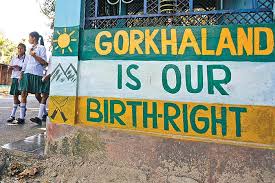Last night, a grenade attack on a Kalimpong police station killed a civic police volunteer and injured two policemen, after a blast in the heart of Darjeeling town on Friday midnight pockmarked shop shutters and shattered windowpanes.
The back-to-back blasts in Darjeeling and Kalimpong have left a confused hill population asking: “What does Bimal Gurung want?”
The Gorkha Janmukti Morcha president, booked under terror laws with his lieutenants over the explosions, has denied involvement. But the widespread perception in Darjeeling is that the blasts could not have happened without the knowledge, if not the blessings, of the hills’ most powerful politician.
The blasts have come at a time the Gorkhaland Movement Coordination Committee, the agitation spearhead, has aired readiness for talks with the state government. The declaration had raised a harried hill population’s hopes of an end to the two-month-old general strike before the Puja tourist season.
“I’m confused; I don’t know what the Morcha wants,” a prominent businessman of the hills said today. Most people understand that the Coordination Committee — a grouping of 14 political and apolitical outfits — is a façade and that the Morcha is the main force.
The Morcha had received tremendous support when it was formed in 2007, primarily because of its commitment to a “democratic agitation”.
Multiple acts of intolerance towards opponents followed, the Morcha preventing the body of Gorkha National Liberation Front chief Subash Ghisingh’s wife from entering the hills, and chasing leaders of other parties out. But the support did not ebb as the statehood agitation remained largely democratic and peaceful between 2007 and 2012.
Some Gurung supporters have tried to give him the benefit of the doubt. “Maybe a hard-line fringe group, which is not under Gurung’s control, is trying to sabotage any talks with the government,” an observer said.
But few in the hills find it plausible that a fringe group can carry out such attacks without the Morcha’s knowledge.
As senior hill politicians speculated about the roots of the violence, some of them pointed to the “contradictory statements” Gurung had issued over the past few weeks.
“He has come out with outlandish remarks like ‘the land is seeking blood’; he has said the 11 deaths till now are ‘only a trailer and the picture is yet to be completed’,” a member of the Coordination Committee said.
“After making such statements, he would say in the same breath that the movement would remain democratic. The question people are asking is, ‘What’s going on in Bimal’s mind?'”
Several hill politicians said that Gurung’s statements had more impact on the agitators than those of any other leader.
Questions were also being asked today about the activities of people like Sanjay Thulung, a Yuva Morcha leader and former member of the Gorkhaland Territorial Administration Sabha.
Thulung has been on the run since his name cropped up in connection with the seizure of a huge cache of arms, apparently bound for the Darjeeling hills, in Assam in November 2014. The haul included an M16 rifle, two Beretta pistols, three .30-bore pistols, and ammunition.
Police had then claimed that Thulung had paid Rs 13.3 lakh to the National Socialist Council of Nagalim to train 15 members of the Morcha youth brigade, the Gorkhaland Personnel.
“The Assam incident cannot be ignored in the context of the present hill situation,” a senior police officer said. “Would Thulung have done it without the knowledge of his party boss?”
A hill politician said: “The allegations of bringing in arms, the blasts in Darjeeling and Kalimpong, the continuous torching of government properties including those of the Darjeeling Himalayan Railway, and Gurung’s statements have created confusion.”
No senior Morcha member was willing to comment on the subject but some of them insisted that the majority within the party wanted a peaceful agitation.
“But since the party also has hardliners, the question is which group is persuading him (Gurung) to issue such statements,” an observer said.


